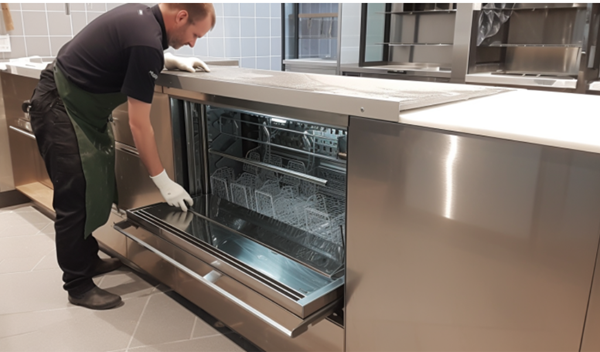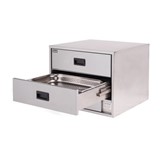Before delving into the usage and maintenance tips, it's essential to familiarize ourselves with the key components and features of commercial undercounter glasswashers. These machines typically consist of a wash chamber, spray arms, detergent and rinse aid dispensers, heating elements, and a control panel.
Expert Advice on Installation Requirements and Maintenance Considerations
Installing a commercial undercounter glasswasher correctly and following proper maintenance practices are essential for its optimal performance and longevity. In this section, we will provide expert advice on installation requirements and maintenance considerations to help you make the most out of your glasswasher.
Installation Requirements
- Location: Choose a suitable location for your glasswasher, keeping in mind factors such as accessibility, ventilation, and proximity to power and water sources. Ensure there is enough space for loading and unloading glassware conveniently.
- Electrical Connection: Check the electrical requirements specified by the manufacturer and ensure that the installation area has the appropriate electrical outlets and voltage capacity to support the glasswasher.
- Water Supply: Connect the glasswasher to a reliable and clean water supply. Install a backflow prevention device to prevent contamination of the water source.
- Drainage: Ensure proper drainage by connecting the glasswasher to a drain line with the necessary capacity. Verify that the drainage system meets local plumbing codes and regulations.
- Leveling: Use a levelling tool to ensure that the glasswasher is installed on a flat surface. Proper leveling helps prevent vibrations, noise, and potential damage to the machine.
Maintenance Considerations
- Regular Cleaning: Clean the interior and exterior surfaces of the glasswasher daily to remove dirt, grime, and fingerprints. Use mild detergent and a soft cloth or sponge to avoid scratching the surfaces.
- Filter Cleaning: Clean and inspect the filters regularly to remove debris and prevent clogs. Refer to the manufacturer's instructions for proper filter maintenance.
- Descaling: Depending on the water hardness in your area, descale the glasswasher periodically to remove mineral deposits that can affect its performance. Use a descaling solution recommended by the manufacturer.
- Seal Inspection: Check the seals and gaskets for signs of wear or damage. Replace any faulty seals to prevent leaks and ensure a watertight operation.
- Component Lubrication: Lubricate moving parts, such as hinges and door mechanisms, as recommended by the manufacturer. Proper lubrication helps maintain smooth operation and extends the lifespan of these components.
- Professional Maintenance: Consider scheduling regular maintenance visits by a professional technician to inspect and service your glasswasher. They can identify potential issues and perform any necessary repairs or adjustments.
- User Training: Provide proper training to staff members responsible for operating and maintaining the glasswasher. Ensure they understand the correct usage procedures, safety precautions, and maintenance routines.
Proper Usage Guidelines for Commercial Undercounter Glasswashers
To ensure the best cleaning results and prolong the lifespan of your commercial undercounter glasswasher, follow these usage guidelines:
-
Preparing Glassware for Washing
Before loading glassware into the glasswasher, it's important to remove any excess food particles, lipstick, or other contaminants. Scrape off solid residues and pre-rinse if necessary.
-
Loading the Glasswasher Correctly
Proper loading is crucial to optimize cleaning efficiency. Avoid overcrowding the machine, as it can hinder water circulation and result in poor cleaning. Place glasses securely in the racks, ensuring they are not touching each other.
-
Selecting the Right Wash Cycle
Most commercial undercounter glasswashers offer different wash cycles to accommodate various glassware types and levels of soiling. Select the appropriate wash cycle based on the type and condition of the glassware being washed.
-
Using the Appropriate Detergent and Rinse Aid
Choose high-quality detergents and rinse aids specifically formulated for commercial glasswashers. Follow the manufacturer's instructions for the correct dosage and ensure that the detergent and rinse aid containers are always filled.
-
Monitoring the Washing Process
While the glasswasher is in operation, periodically check the wash progress to ensure that the glasses are being cleaned properly. Address any issues promptly, such as low water pressure or malfunctioning spray arms.
Maintenance Tips for Commercial Undercounter Glasswashers
Regular maintenance is essential to keep your commercial undercounter glasswasher in optimal condition. Follow these maintenance tips:
-
Regular Cleaning and Descaling
Clean the wash chamber, filters, and spray arms regularly to remove accumulated debris and prevent clogging. Additionally, descale the machine periodically to remove mineral deposits that can affect its performance.
-
Inspecting and Replacing Components
Inspect the machine's components, such as seals, wash arms, and pumps, for signs of wear or damage. Replace any faulty or worn-out parts promptly to avoid further complications.
-
Ensuring Proper Drainage
Check the drainage system to ensure proper water flow and prevent clogs. Clean the drain filter regularly and inspect the drain hose for any obstructions.
-
Preventing Mineral Deposits and Stains
To minimize mineral deposits and stains on glassware, use a water softener or install a water treatment system if your area has hard water. Hard water can leave spots and streaks on glassware.
-
Regular Maintenance Schedule
Create a maintenance schedule for your commercial undercounter glasswasher, including tasks like cleaning, descaling, and component inspection. Adhering to a routine will help prevent major breakdowns and ensure consistent performance.
The Importance of Following Manufacturer Instructions for Optimal Performance and Longevity
When it comes to commercial undercounter glasswashers in Sydney, following the manufacturer's instructions is crucial for achieving optimal performance and ensuring the longevity of the appliance. Manufacturers provide detailed guidelines and recommendations based on their extensive knowledge and experience with their specific products. In this section, we will highlight the importance of adhering to manufacturer instructions.
1. Safety and Proper Usage
Manufacturer instructions outline the correct procedures for safely operating the glasswasher. This includes guidelines on electrical connections, water supply, and loading and unloading glassware. By following these instructions, you minimize the risk of accidents, electrical hazards, and damage to the machine or glassware.
2. Optimal Cleaning Efficiency
Manufacturers design their glasswashers to deliver efficient cleaning results. The instructions provided specify the appropriate wash cycles, water temperatures, and detergent and rinse aid usage. By following these guidelines, you ensure that the glasswasher operates at its intended capacity, effectively removing stains, debris, and bacteria from the glassware.
3. Protecting the Machine
Each glasswasher model has its unique features and components. The manufacturer instructions provide specific information on how to handle, clean, and maintain these components. By following these instructions, you protect the machine from unnecessary wear and tear, prevent damage to critical parts, and maintain its overall performance and lifespan.
4. Warranty Coverage
Most glasswasher manufacturers offer warranties that cover certain parts and repairs. However, these warranties often come with conditions, including following the provided instructions for installation, usage, and maintenance. Failure to comply with these instructions may void the warranty, leaving you responsible for repair costs. Adhering to the manufacturer's instructions ensures that you remain eligible for warranty coverage if needed.
5. Efficient Troubleshooting
In the event of a malfunction or issue with the glasswasher, the manufacturer's instructions often include troubleshooting steps. These steps help you identify and resolve common problems quickly and efficiently. By following the troubleshooting instructions, you may be able to avoid unnecessary service calls or delays in restoring the glasswasher's functionality.
6. Compliance with Regulations
Manufacturer instructions often take into account local regulations and standards for electrical connections, water supply, and drainage. Following these instructions ensures that your glasswasher meets the necessary requirements, reducing the risk of non-compliance and potential legal issues.
10 Tips for Loading Glassware Properly to Ensure Thorough Cleaning and Prevent Breakage
Loading glassware properly in a commercial undercounter glasswasher is essential to achieve thorough cleaning results and prevent breakage. By following these tips, you can optimize the washing process, protect your glassware, and ensure efficient operation of the machine.
- Sort and Separate: Before loading, sort the glassware based on type and fragility. Separate delicate items from heavier or sturdier ones to prevent breakage and ensure that each type receives appropriate cleaning.
- Pre-Rinse if Necessary: If glassware has dried-on residue or stubborn stains, consider pre-rinsing them before loading. This helps remove larger particles and makes the cleaning process more effective.Avoid Overcrowding: Avoid overloading the glasswasher. Crowding glassware can hinder water circulation and prevent proper cleaning. Allow sufficient space between items to ensure thorough coverage by water and detergent.
- Securely Position Glasses: Place glasses securely in the rack or compartments provided by the glasswasher. Ensure that they are stable and not touching each other. This prevents glasses from colliding during the wash cycle, reducing the risk of breakage.
- Face Glasses Down: For most glassware, it is recommended to load them with the open side facing down. This position allows water and detergent to reach the interior and facilitates the removal of residues and stains.
- Avoid Nesting: Avoid nesting glasses within each other, especially delicate glassware. Nesting can trap water, detergent, or debris between the nested glasses, leading to incomplete cleaning and potential damage.
- Separate Silverware and Utensils: To prevent scratches or damage to glassware, load silverware and utensils separately. Place them in designated compartments or utensil holders provided by the glasswasher.
- Avoid Overlapping: Avoid overlapping stemware or glasses with handles. Overlapping can prevent proper water circulation around these areas, resulting in incomplete cleaning and potential damage.
- Use Glass Racks or Dividers: Utilize glass racks or dividers designed specifically for your glasswasher. These accessories help secure and separate glassware effectively, reducing the risk of breakage and improving cleaning efficiency.
- Follow Load Capacity Guidelines: Adhere to the load capacity guidelines provided by the glasswasher manufacturer. Overloading can strain the machine and compromise cleaning performance. Stay within the recommended limits for optimal results.
Best Practices for Cleaning and Maintaining the Glasswasher's Interior and Filters
Regular cleaning and maintenance of the glasswasher's interior and filters are vital to ensure its optimal performance and longevity. By following these best practices, you can maintain a clean and efficient glasswasher, resulting in sparkling glassware and a smoothly running operation.
Cleaning the Interior:
- Daily Cleaning: After each use, thoroughly clean the interior of the glasswasher. Remove any remaining debris, food particles, or glass fragments to prevent clogs and maintain hygiene.
- Use Mild Detergent: Use a mild detergent specifically formulated for glasswashers. Avoid using abrasive cleaners or scouring pads that could scratch the interior surfaces.
- Scrub and Rinse: Scrub the interior surfaces, including the walls, racks, and spray arms, with a soft brush or sponge. Pay close attention to hard-to-reach areas where residue can accumulate. Rinse the interior thoroughly with clean water.
- Check Spray Arms: Inspect the spray arms for clogs or blockages. Remove any debris, mineral deposits, or particles that might hinder water flow. Ensure that the spray arms can rotate freely for optimal cleaning coverage.
- Wipe Dry: After cleaning, wipe the interior surfaces with a clean, dry cloth to remove excess moisture. This helps prevent the growth of mold or mildew.
Cleaning and Maintaining the Filters:
- Regular Filter Cleaning: Clean the filters regularly to prevent clogs and ensure proper water circulation. Follow the manufacturer's instructions for removing and cleaning the filters.
- Inspect for Debris: Check the filters for trapped debris, such as food particles or glass fragments. Rinse the filters under running water to remove any residue. Use a soft brush to gently scrub away stubborn deposits.
- Replace Worn-out Filters: Over time, the filters may become worn or damaged. Replace them as recommended by the manufacturer to maintain optimal filtration efficiency.
- Check Drain Filter: If your glasswasher has a drain filter, inspect and clean it regularly. Remove any debris or buildup that might impede proper drainage.
Descaling:
- Follow Manufacturer's Instructions: Depending on the water hardness in your area, descaling the glasswasher may be necessary to remove mineral deposits. Follow the manufacturer's guidelines for the recommended descaling frequency and procedure.
- Use Descaling Solution: Use a descaling solution recommended by the manufacturer. Follow the instructions for the appropriate dosage and application method. Ensure that the solution is compatible with the materials used in your glasswasher.
- Run Descale Cycle: If your glasswasher has a specific descale cycle, activate it according to the manufacturer's instructions. This cycle allows the descaling solution to circulate and remove mineral deposits from internal components.
- Rinse Thoroughly: After the descaling process, rinse the glasswasher thoroughly with clean water to remove any traces of the descaling solution. This ensures that no residue remains that could affect the cleanliness of the glassware.
Proper usage and maintenance of commercial undercounter glasswashers are vital for optimal performance, longevity, and hygiene. By following manufacturer instructions, users ensure safety, efficient cleaning, and protection of the machine and glassware. Installation requirements, regular cleaning, filter maintenance, descaling, and proper loading contribute to thorough cleaning results. Adhering to these practices and guidelines guarantees optimal performance and extends the lifespan of the glasswasher.





-160x160-state_article-rel-cat.png)





-160x160-state_article-rel-cat.png)











-205x205.png)


